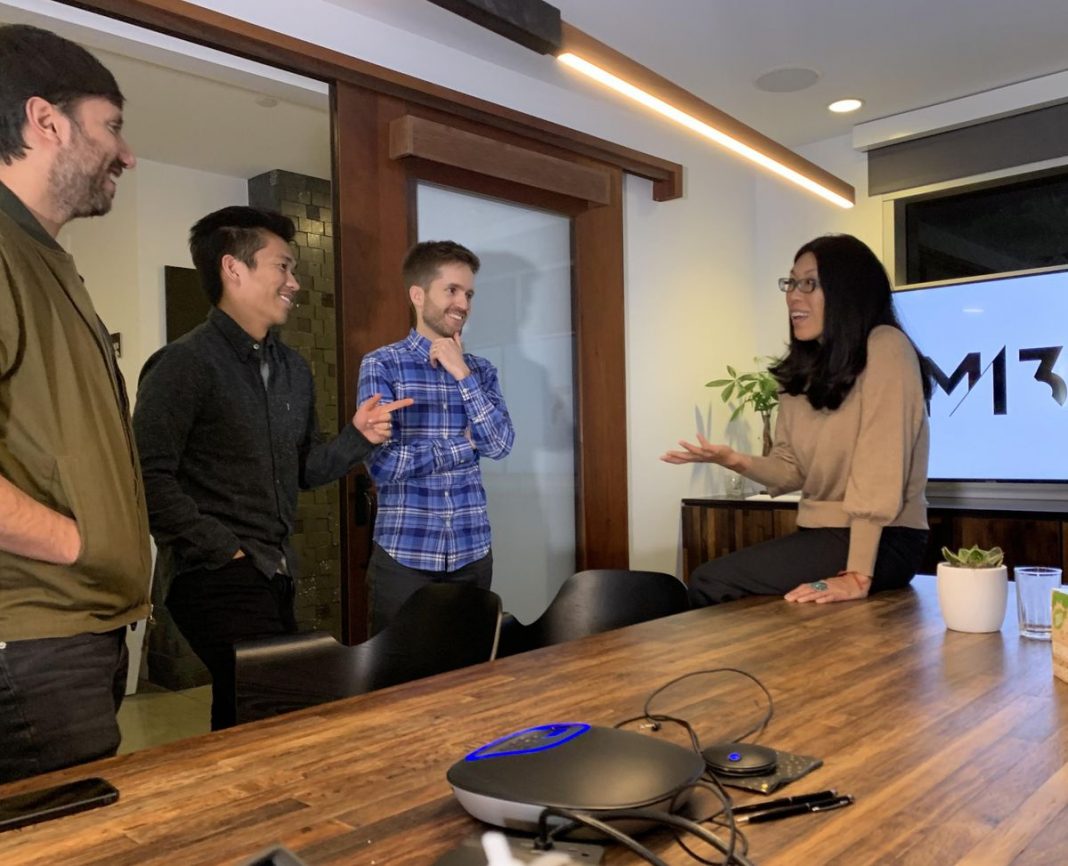
Christine Choi, partner and head of brand at M13, with startup founders from Emerge
Messier 13 (M13)
Last year the economy saw a drastic shift in consumer behaviors. When social distancing became a mandate, online shopping increased. According to a McKinsey report, there was a 35% increase in digital purchases in the over-the-counter medicine, groceries, household supplies and personal-care products. During the pandemic, 75% of U.S. consumers have engaged in a new shopping behavior in response to economic pressures, store closings, and changing priorities. Consumers are severing loyalty with brands. Thirty-six percent of consumers are trying a new product brand and 25% are incorporating a new private-label brand in their daily routines, with 73% of those consumers stating they intend to continue using the brand after pandemic subsides.
Messier 13 (M13), a venture capital firm focused on identifying and understanding the core technologies that will drive and change consumer behavior over the next decade, started by investing heavily in its own firm. Founders Carter and Courtney Reum brought on Christine Choi (head of brand), Lizzie Francis (head of operations) and Anna Barber (head of Launchpad) as partners to assist with the company’s portfolio companies.
The company is a venture engine made up of three components: a $200 million investment fund that invests in early-stage consumer tech, a platform of experts and resources, and an in-house incubator. Its portfolio consists of brands that are becoming a household name, including Snapchat, SpaceX and Ring.
“What we’ve seen is that brands are leveraging data and technology to their advantage this year to create that connection with the consumer,” Francis shares. “We’re seeing tailwinds really supporting where we invest in technology companies that are transforming with data and technology. Separately, we’re also seeing that consumers are incredibly interested in health and wellness.”
Francis started her career in finance in marketing and advertising. She realized that she liked the connection with the consumer, which led her to work in technology. Before joining M13, she launched a venture capital firm investing in early-stage companies.
“What I loved about M13’s vision was this idea that we could help founders unlock, given our deep experience and empathy and understanding, what the right choices are or the better choices to make that would help them unlock the potential of their brands,” Francis states. “It’s those moments that are the aha moments that are game-changers. It gives you the will and the courage to continue to build something new and exciting and transformational.”

Lizzie Francis, partner and head of operations at M13.
Messier 13 (M13)
Around the same time Francis joined M13, Choi accepted an offer. Out of college, she became a social entrepreneur as one of the founding members of Teach for America. She then pivoted to the Virgin Group, working directly with Richard Branson. After 12 years, she then worked in Silicon Valley before joining the Reum brothers.
“First and foremost,” Choi states, “we don’t want to be defined by genders, right? We want to be defined by our talents and skills and accomplishments. However, because of the status quo, there is a responsibility and role for all of us to play. I saw firsthand just how important it was to step up and express different opinions. Also, just how giving access to more opportunities for underrepresented people can make business decisions better.”
Prior to joining the M13 team in November, Barber started her career as a corporate lawyer. She then transitioned into the startup sector when the internet was still a new technology to consumers. After serving multiple startups, Barber founded a couple of companies and even delved into the entertainment industry as a talent manager.
After her last startup exit, she realized that she wanted to help other founders be successful. Barber became a certified executive coach and planned on launching a career as a coach for mostly early-stage female founders. However, TechStars offered her a position to operate its accelerator program investing in and supporting early-stage companies in growth strategies.
“When I’m recruiting founders,” Barber explains, “I choose people that I would be willing to work for. … I am looking for people in whose leadership I have absolute confidence. I see my role as their coach and mentor, not so much to kind of give them advice, although advice can be extremely helpful. … What I really see my role is doing is working with founders to make sure they’re asking the right questions, and then to take the advice that they get and use it in order to arrive at what they know is the right answer.”

Anna Barber, partner and head of Launchpad at M13, presenting at a conference.
Messier 13 (M13)
Not only has M13 seen changes in consumer behaviors in health and wellness, but it has also seen changes in the edtech space. The pandemic has allowed for this sector to undergo massive innovation.
As Choi, Francis and Barber transitioned within their careers, they’ve focused on the following essential steps:
- Expand your network. Connect with people who are in the field you want to pivot to and be curious about their points-of-views. Focus on the advice that works for you and ignore the advice that doesn’t work.
- Network your network. If you solely focus on your network, you’ll never be able to expand your Rolodex. Ask your network who they can connect you to that could be a solid resource.
- Take on a new role and identity in a gradual way. Think of your work as a portfolio. Take what you’re passionate about and start to research and become an expert in that area.
Choi concludes, “Something that really excites me about the consumer behavior changes that are happening now is that it’s actually empowering business leaders like us to really help our startup founders build teams that reflect the future; to reflect what stakeholders want, not just shareholders and profit-making.”




